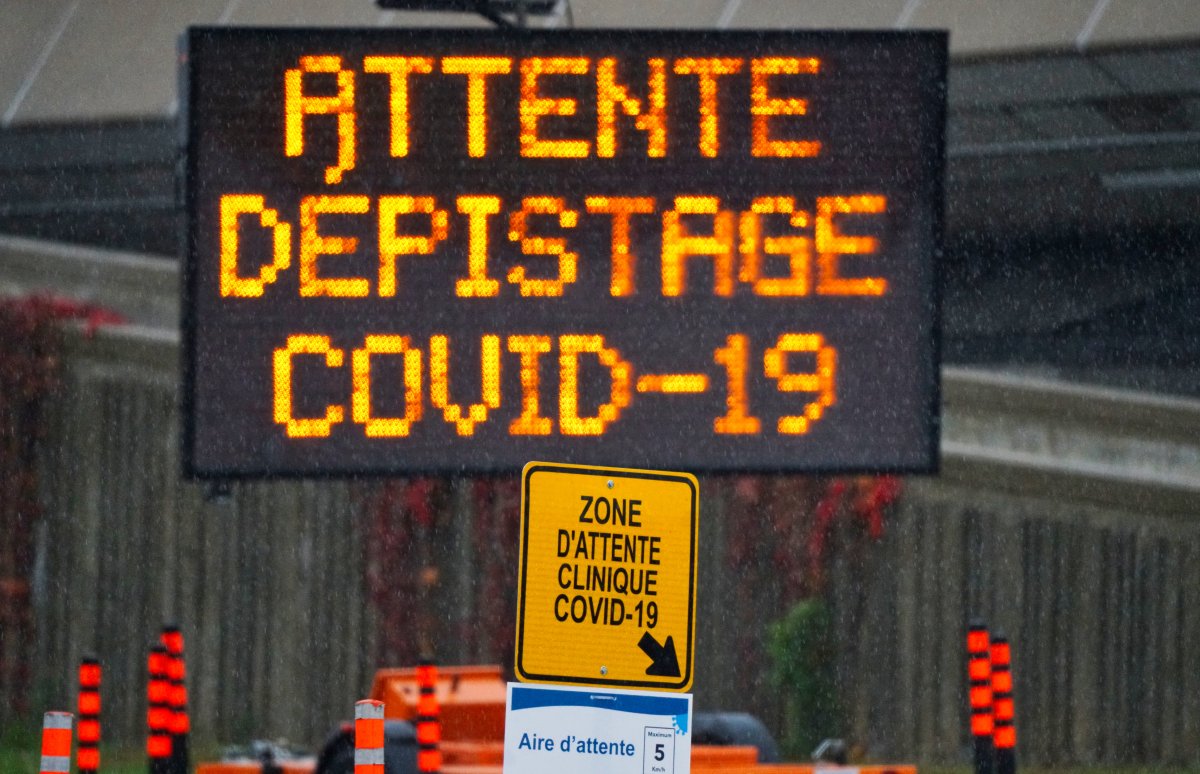Montreal is starting to see a plateau of new COVID-19 cases after three weeks of partial lockdown measures but officials warn the second wave of the pandemic isn’t over yet.

Dr. Mylène Drouin, director of Montreal public health, said Wednesday the city is “progressing in the right way” thanks to citizens’ efforts and sacrifices throughout the month of October.
“I would like to convey the following message: we have to remain prudent collectively,” she said.
There has been an average of 245 new cases per day in the region, which is a designated novel coronavirus red zone. Drouin said there are currently 200 active outbreaks in Montreal as of Wednesday.
READ MORE: Quebec records 1,072 new cases, 19 more deaths linked to coronavirus
Despite a stabilization of new infections, Drouin said some parts of the city are hot spots, including the Parc-Extension and Pointe-Saint-Charles neighbourhoods.
Montrealers must continue to exercise vigilance and abide by public health directives to stem the tide of COVID-19, she added.
“It’s not a sprint, it’s a marathon,” she said. “But I think we’re all headed in the right direction.”
Montreal Mayor Valérie Plante said the new numbers are encouraging and urged citizens not to let their guard down.
- Buzz kill? Gen Z less interested in coffee than older Canadians, survey shows
- ‘She gets to be 10’: Ontario child’s heart donated to girl the same age
- Canada updating sperm donor screening criteria for men who have sex with men
- Bird flu risk to humans an ‘enormous concern,’ WHO says. Here’s what to know
The health crisis has also been hard on the city’s homeless population and the city is preparing for the cold winter months during the pandemic, according to Plante. She said the hours of shelters could be extended and 400 emergency beds will be available to meet demands.
Montreal hospitals can still take on more patients
Sonia Bélanger, head of the CIUSSS du Centre-Sud-de-l’Île-de-Montréal, said 140 people are in hospital in Montreal due to the pandemic. Of those patients, 36 are in intensive care.
“This is a slow rise. Every day there is a slight number of additional patients that are added,” she said. “The situation is pretty much the same as two weeks ago.”
Bélanger said that Montreal hospitals still have wiggle room during the second wave. There are 1,000 beds in total across the region’s network to accommodate patients and about 100 reserved in intensive care units.
However, there is a scarcity of resources when it comes to nursing and other health-care staff, who were stretched thin during the spring.
On top of high demands in the network, Bélanger said 100 employees have contracted the virus and 200 are waiting for test results.

Pandemic hard on young Montrealers
The Montreal public health department is also looking at the effects of the ongoing health crisis on young adults’ health and wellbeing.
Drouin said Montrealers aged 18 to 29 are dealing with a variety of “collateral impacts” as a result of the crisis. Public health has found they are just as aware as other groups about the virus and understand the importance of preventive measures, she added.
She cited a decrease of motivation and a rise in mental health issues among a group that has been vulnerable to pandemic-related layoffs.
The research from public health has found that 46 per cent of young people aged 18 to 24 in Montreal have reported symptoms of generalized anxiety or depression.
READ MORE: Quebecers asked to take care of mental health amid tough coronavirus restrictions
Drouin said she wants to mitigate the impacts of the pandemic on young people “who are just starting their lives.”
Earlier this week, Quebec Premier François Legault urged people to take care of themselves. He acknowledged the tighter restrictions during the second wave and isolation from others are difficult for many, especially for those who live alone.
“I am very aware that the measures put in place are hard for Quebecers,” he said.
The government is urging anyone who feels unwell or is experiencing anxiety to call the 811 hotline.
— With files from Global News’ Olivia O’Malley





Comments